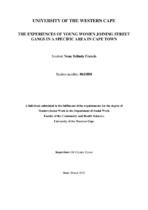| dc.contributor.advisor | Dykes, Glynnis | |
| dc.contributor.author | Francis, Nena Belinda | |
| dc.date.accessioned | 2022-03-17T07:35:19Z | |
| dc.date.available | 2022-03-17T07:35:19Z | |
| dc.date.issued | 2021 | |
| dc.identifier.uri | http://hdl.handle.net/11394/8912 | |
| dc.description | Magister Artium (Social Work) - MA(SW) | en_US |
| dc.description.abstract | The Western Cape province is known as the gang violence capital in South Africa with the highest murder rate, of which a significant number is gang related. Gangsterism is stereotypically male dominance; and many research studies having focused on males in gangs. International studies recognised the substantial numbers of female membership, that women in gangs are vulnerable and at risk of experiencing victimization and exploitation; a realm of gender-based violence (GBV) within a male nominated gang environment, overlooked by many. This domain of violence contributes to the much challenging high rate of GBV in South Africa. Hence, there is a need to create awareness and recommendations within a social work setting to determine gender-specific services for women in gangs. | en_US |
| dc.language.iso | en | en_US |
| dc.publisher | University of the Western Cape | en_US |
| dc.subject | Gang membership and exploitation | en_US |
| dc.subject | Child victimisation | en_US |
| dc.subject | Gender marginalisation | en_US |
| dc.subject | Young women | en_US |
| dc.subject | Cape Town | en_US |
| dc.title | The experiences of young women joining street gangs in a specific area in Cape Town | en_US |
| dc.rights.holder | University of the Western Cape | en_US |

